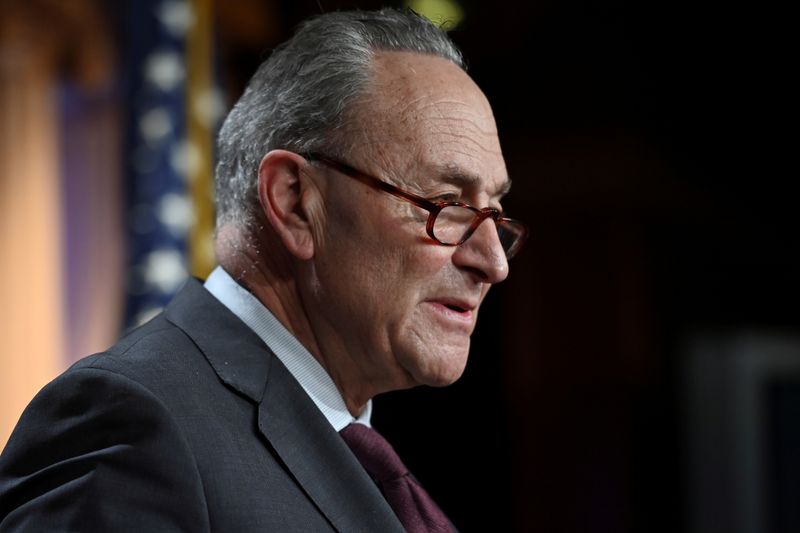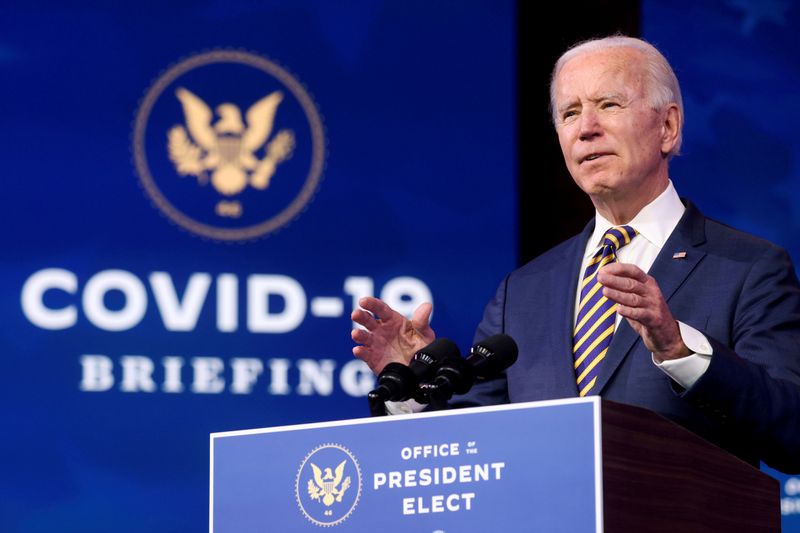By Susan Cornwell and Richard Cowan
WASHINGTON (Reuters) - The U.S. Senate, in the throes of a marathon debate over the shape of President Joe Biden's $1.9 trillion coronavirus aid plan, voted overwhelmingly on Thursday to exclude upper-income Americans from a new round of direct payments to help stimulate the economy.
By a vote of 99-1, the Senate approved an amendment recommending that high-income earners not qualify for a new round of government checks that could amount to $1,400 for individuals. Republican Senator Rand Paul was the lone dissenter.
Details of the income cap would still have to be worked out in subsequent legislation.
"The decent compassionate thing is for us to target the relief to our neighbors who are struggling every day to get by" during the coronavirus pandemic, said Democratic Senator Joe Manchin, author of the proposal.
Earlier direct payments provided $1,200 for eligible individuals and $2,400 for most married couples, with an additional $500 per eligible child. The payments began phasing out at $75,000 for individuals and $150,000 for married couples.
The Senate was expected to work late into the night in a "vote-a-rama" session aimed at overriding Republican opposition to Biden's sweeping COVID-19 relief plan - a top priority of his young administration.
The "budget resolution" Democrats aim to pass in the Senate, following House of Representatives passage on Wednesday, would unlock a legislative tool called reconciliation. It is designed to allow Democrats to approve Biden's proposal in the narrowly divided chamber with a simple majority.
Most legislation must get at least 60 votes in the 100-seat Senate to pass. But the chamber is divided 50-50 and Republicans oppose the Democratic president's proposal. Reconciliation would allow the Senate's 48 Democrats and two independents who align with them to approve the relief package with a tie-breaking vote from Vice President Kamala Harris.
Senate Democrats and the Biden administration have left the door open to Republican participation but have said they want comprehensive legislation to move quickly to address a pandemic that has killed more than 450,000 Americans and left millions jobless.
"Seeing long lines of people waiting to get food around the country is something we should never see in the United States," U.S. Treasury Secretary Janet Yellen said on ABC News' "Good Morning America" program.
"This is really an urgent need. And we need to act big. We need to make sure that we provide a bridge so that people aren't scarred indefinitely by this crisis," she said.
The Democrats' march to add more assistance to last year's $4 trillion in coronavirus relief could be complicated by the impeachment trial of Republican former President Donald Trump, which is set to begin next week and could distract from the legislation.
AMENDMENTS
Besides the income cap amendment, the Senate in early voting passed amendments stating that illegal immigrants should not receive government aid included in any COVID-19 aid bill Congress passes in coming weeks. Senators also agreed that small businesses should not see their taxes raised during the pandemic.
Once adopted, the budget resolution would provide spending instructions to House and Senate committees charged with crafting COVID-19 relief legislation, which is likely to take weeks.
Congress would then take up the bill for passage under the reconciliation tool. Democrats say they are determined to pass the legislation before enhanced unemployment payments expire in mid-March.
The reconciliation measure does not require the president's signature to take effect. With amendments being approved, the package would return to the Democratic-led House, which would need to vote on it again.
Republican lawmakers have said they could offer up to 20 amendments.
Senate Minority Leader Mitch McConnell, decrying what he called "this phony partisan budget," said Republicans would offer amendments to reverse the "job-killing" cancellation of the Keystone pipeline and block a higher minimum wage.
Senator Mitt Romney, a moderate Republican, was expected to offer an amendment that would provide $4,200 per year for every preschool child and $3,000 per year for every school-age child.

Republican Senator Josh Hawley, a conservative, was expected to propose withholding assistance from schools that do not reopen for in-person learning.
